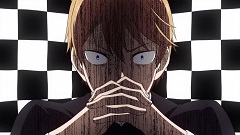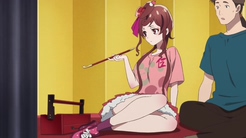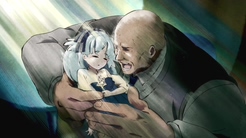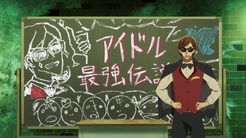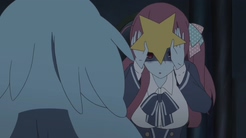I, uh, wasn’t crazy about this episode of Kaguya-sama. As the end of the decade approaches, I’ve been thinking about my favorite anime of the last ten years, and I was originally hopeful that Kaguya would be able to hang with rom-coms like Ore Monogatari and Gekkan Shoujo Nozaki-kun on that list. Unfortunately, the second half of the show (so far) hasn’t appealed to me like the first part did. My main gripe with this particular episode was that it pushed some of its characters outside their established behavioral boundaries. It never happened without justification, but some of the reasoning it provided felt inadequate, especially in the last of these three chapters. Since all three of them led into each other, with Kaguya’s sickness as the core focus, the whole package was kind of soured. Let me just skip to the third segment and explain what I mean here.
When Shirogane visits a sick-in-bed Kaguya, he discovers that she has transformed into a half-delirious infant (something he’d hoped to see during the Concentration game in part two). Her design is amended accordingly, with downturned eyes and two-tone irises, as opposed to the sharper, more colorful expression she typically wears. She’s on the floor, searching for fireworks in a mess of her own making, and has to be mothered back into bed by Hayasaka (who’s in disguise as a gaijin maid). Aoi Koga even does her best Konomi Kohara impression to give her character the same sense of innocence that Fujiwara carries. It’s actually Hayasaka who provides the explanation for Kaguya’s current state: since her mind is always working at full capacity, her ego is particularly vulnerable to her id during periods of illness. Yes, the show actually trots out Freud’s model of the psyche to explain a character’s sudden witlessness, but this isn’t immersion-breaking by itself. Kaguya-sama has been dropping psychological terms into its script since the beginning.
The real problem stems from the show’s attempt to have it both ways, with a sudden seriousness taking hold when Kaguya explains that she can only manipulate people to express her feelings. We get a clear look at the Shinomiya motto during this scene, which hangs ominously on the wall and instructs family members not to love or rely on anyone. This maxim can be glimpsed in the hallway leading to Kaguya’s room several times before her admission, so it’s nice that the show primed us for that moment, but given the infantilized version of her character on screen just minutes beforehand, the whole segment feels inappropriately sincere. Everything that follows (Kaguya’s dominant id pulling Shirogane into bed with her, then kicking him out when she wakes up in her right mind) feels like the usual anime rom-com bullshit. Kaguya’s past fantasy about the Shirogane family accepting her was a much funnier and less direct way of detailing her oppressive home life, for my money – everything to do with her sickness was all over the place.
Chapters one and two from this week didn’t hold much appeal for me, either. This writeup has already been negative enough, but for the sake of completion, I’ll say a few words about them. In the first segment, there was too much shouting for me. Fujiwara screaming about the kleptomaniac thunder god, Kaguya’s maniacal switching of the president’s phone battery (complete with off-tempo clock sounds for some reason), and Shirogane’s war cry as he pedaled his bike through the rain grated on my nerves before I ever got to the third chapter. It was too much intensity for too little payoff. As for the memory game in the middle, it was fine. Notably, we got to see Fujiwara at her most devious, utilizing multiple rigged decks of cards to win the honor of visiting a sick Kaguya. She’s played to win before (think back to the banned word game), but this was a new side of her that felt natural, especially given her sheepish reactions to being caught. Alright, I’m off my soapbox for this week.



